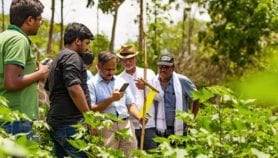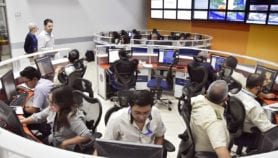By: Jia Hepeng
Send to a friend
The details you provide on this page will not be used to send unsolicited email, and will not be sold to a 3rd party. See privacy policy.
[XIAMEN] Science communicators in the central Chinese province of Henan are launching a programme that will give farmers access to information on the Internet without needing a computer.
According to Feng Fengju of the Science and Technological Service Centre of Puyang City, Henan, farmers will be able to access information through their telephones, by requesting information using their keypads and listening to answers to their enquiries through their earpieces.
Feng announced the programme at a national symposium on science popularisation, held in Xiamen, Henan province, earlier this month.
“In our poor regions, it is impossible for the average farmer to afford a computer, let alone access the Internet,” Feng told SciDev.Net “Even if they could afford a computer, they would not know how to use it.”
According to China’s National Internet Information Centre, in 2003, just two per cent of China’s rural population — mostly in wealthier coastal areas — had Internet access. However, many rural families have installed telephones, which they seldom use.
In 2000, Feng and her colleagues established a database of information on agricultural technologies, health guidelines and employment opportunities that could be used to help answer telephone enquiries.
They then developed a set of codes, representing various common enquiries that users would be able to input through their telephone keypads.
A farmer wanting to know how to raise a new breed of cow, for example, would, following the automatic operator’s instructions, have to first press a code for ‘agricultural technology’, then enter a code in the sub-menu for ‘animal husbandry’, and then a code in third level menu for ‘cow’, and finally a code for the breed of cow they want information on.
Software would then relay relevant information from the database using a pre-recorded voice.
About 30,000 farmers used the service and their positive response prompted Feng and her colleagues to enhance the system in late 2003 by adding real-time information from the Internet.
With funding from the local government, they hired a Beijing-based software company to develop a more advanced system able to interpret telephone keypad enquiries orders and, in response, relay up-to-date Internet information to enquirers.
They also redesigned their code system and selected as sources some authoritative websites such as the national agricultural information network operated by the Ministry of Agriculture.
For example, a farmer wanting to know the market price for wheat would press 1 on their keypad for grain, then press 2 for wheat, and then press 1 again to access the Ministry of Agriculture’s national agricultural exchange website. By pressing 1 again, the farmer would be able to find out the current price of wheat.
The new system, which opened for trial operation with several thousand users in early September, now includes the original computer database and at least a dozen authoritative websites.
Twenty members of staff are also available to answer questions on their mobile telephones when enquirers cannot find answers they seek from the database and or the websites.
The new system cost just 150,000 yuan (US$18,000) to set up. Its running costs are also low both for operators and for users. By using the telephone to access the Internet, farmers need only to pay the cost of telephone calls — 0.1 yuan (less than US$0.02) per minute.
Feng says the system will be formally launched in December, by which time up-to-date information will be available from several dozen authoritative websites related to agriculture and rural livelihoods.
“The technology is not difficult, and costs less than we expected,” says Feng. “But no one has done it so far. It is just a question of whether you really want to serve farmers who are not Internet-literate.”
“The software company did not charge us too much,” says Feng. “This is partly because we are serving poor farmers, and partly because they can now use the enquiry code system we developed elsewhere.”
The telecom company, for which the fact that rural telephones are rarely used is a problem, offered a discount on telephone lines. Feng’s model of combining telephone, Internet and computer-based database could greatly increase the use of rural telephones.













